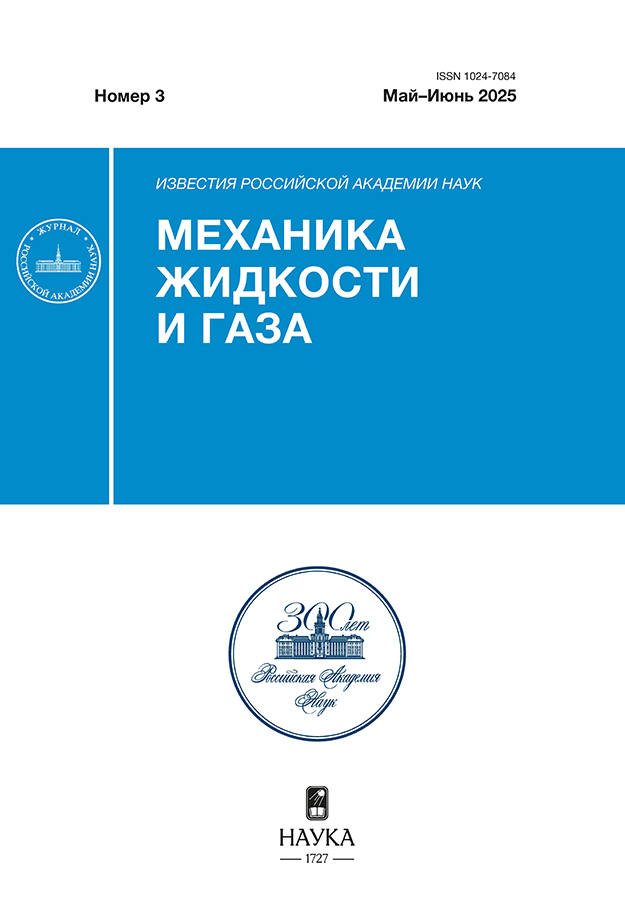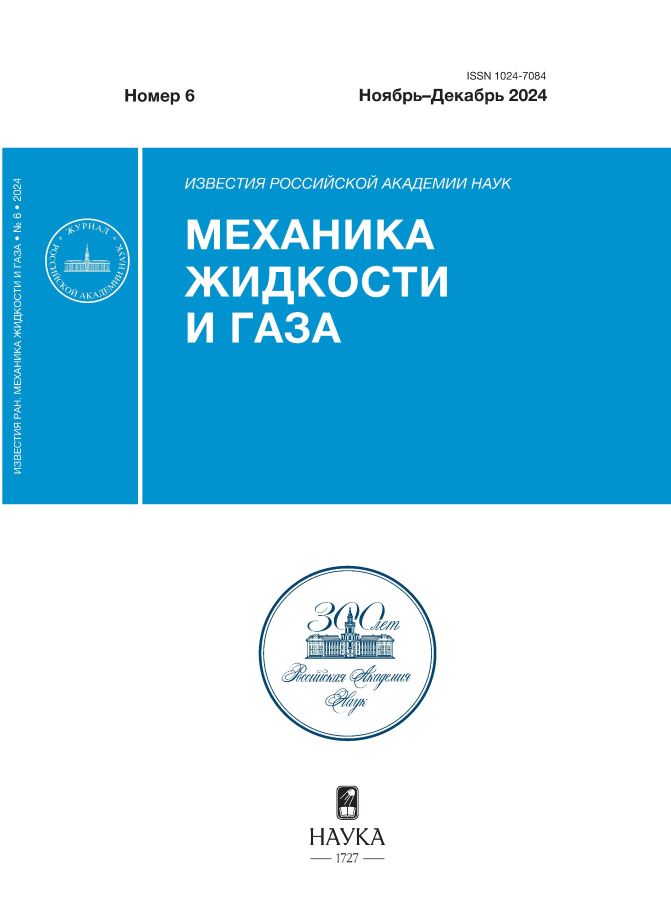AXISYMMETRIC POISEUILLE FLOW WITH TEMPERATURE-DEPENDENT VISCOSITY UNDER PRESSURE AND TEMPERATURE GRADIENTS
- Authors: Knyazev D.V1
-
Affiliations:
- Institute of Continuous Media Mechanics of the Ural Branch of the Russian Academy of Sciences
- Issue: No 6 (2024)
- Pages: 12-21
- Section: Articles
- URL: https://rjmseer.com/1024-7084/article/view/682537
- DOI: https://doi.org/10.31857/S1024708424060022
- EDN: https://elibrary.ru/FETQOY
- ID: 682537
Cite item
Abstract
The study of steady-state axisymmetric Poiseuille flow of a Newtonian fluid induced by streamwise pressure and temperature gradients in the case of the dynamic viscosity coefficient dependent on the temperature is reduced to finding solutions to a three-parameter boundaryvalue problem for a third-order ordinary differential equation. In the domain of the parameter space corresponding to negative axial temperature gradients, there exist two branches of solutions describing flows accompanied by heat removal from the fluid. When the branches meet, they form a boundary in the phase space beyond which no solutions to the Poiseuille-type problem exist. One of the branches can be continued into the domain of non-negative values of the streamwise temperature gradient and contains an isothermal Poiseuille solution. Along this branch, curve of the flow rate as a function of the dimensionless axial temperature gradient has a minimum in the domain of positive values of the latter. In this part of the parameter space, the heat exchange regime with the external medium depends on the relation between all three dimensionless numbers of the problem. The heat exchange regime affects the nature of flow, slowing down the flow near the rigid wall during heat transfer, and forming a more filled velocity profile when heat is absorbed by fluid.
About the authors
D. V Knyazev
Institute of Continuous Media Mechanics of the Ural Branch of the Russian Academy of Sciences
Email: dvk@icmm.ru
Perm, Russia
References
- Евдокимов И.Н., Елисеев Н.Ю. Молекулярные механизмы вязкости жидкости и газа. Ч. 1. М.: РГУ нефти и газа им. И.Н. Губкина, 2005. 59 с.
- Kulikov Yu. M., Son E.E. Fluid flow with abrupt viscosity — temperature dependence // Hight Temp. 2014. V 52. № 5. P 723-729.
- Регирер С.А. Влияние теплового эффекта на вязкое сопротивление в установившемся одномерном течении капельной жидкости // Прик. мат. и мех. 1958. Т. 22. В. 3. С. 414-418.
- Каганов С.А. Об установившемся ламинарном течении несжимаемой жидкости в плоском канале и круглой цилиндрической трубе с учётом теплоты трения и зависимости вязкости от температуры // Прик. мех. и тех. физ. 1962. № 3. С. 96-99.
- Худяев С.И. Об одном классе интегрируемых уравнений в задачах горения и гидродинамики // Мат. моделирование. 1995. Т. 7. № 1. С. 35-60.
- Найдёнов В.И. Об автомодельности одной задачи конвектривного теплообмена // Прик. мех. и тех. физ. 1974. № 5. С. 152-153.
- Аристов С.Н. Стационарное течение несжимаемой жидкости с переменной вязкостью // Доклады РАН. 1998. Т. 359. №. 5. С. 625-628.
- Найдёнов В.И., Полянин А.Д. О некоторых нелинейных конвективно-тепловых эффектах в теории фильтрации и гидродинамике // Доклады АН СССР. 1984. Т. 279. № 3. С. 575-579.
- Аристов С.Н., Зеленина В.Г. Влияние теплообмена на пуазейлевское течение с переменной вязкостью // Изв. РАН. МЖГ. 2000. № 2. С. 75-80.
- Гершуни Г.З., Жуховицкий Е.М., Непомнящий А.А. Устойчивость конвективных течений. М.: Наука. 1989. 320 с.
- Поляков А.Ф. Установившееся вязко-термогравитационное течение капельной жидкости и теплообмен в вертикальной полости при асимметричных тепловых условиях // Теплофиз. выс. темп. 2014. Т. 55. В. 1. С. 78-83.
- Хорин А.Н., Конюхова А.А. Течение Куэтта горячего вязкого газа // Вестн. Сам. гос. тех. ун-та. Сер. Физ.-мат. науки. 2020. № 2. С. 365-378.
- Брутян М.А., Ибрагимов У.Г. Автомодельное несимметричное течение вязкого газа в клине // Прик. мат. и мех. 2022. Т. 86. В. 5. С. 741-752.
- Янке Е., Эмде Ф., Лёш Ф. Специальные функции. М.: Наука. 1968. 344 с.
- Князев Д.В. Течение Пуазейля термовязкой жидкости под действием продольных градиентов давления и температуры // Пермские гидродинамические научные чтения. Сборник докладов. Пермь. 2023. 510 с. http://www.psu.ru/files/docs/science/books/sborniki/permskie-gidrodinamicheskie-nauchnyechteniya-2023.pdf.
Supplementary files











